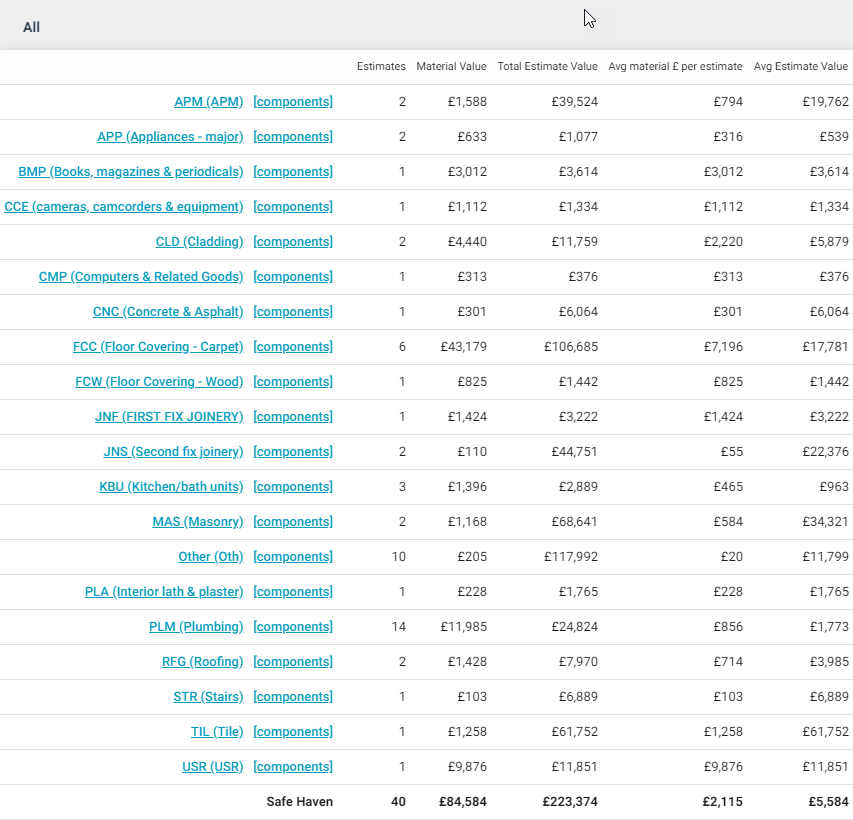Graphical Management Reports
- Code Upgrade by Category
- Corrosion Mitigation
- Estimate Flooring Usage
- Estimate Inclusion Issues
- Estimate Items by Quality
- Estimate Overhead and Profit
- Estimate Roofing Usage
- Estimate Scoping Overlap
- Estimate Siding Usage
- Estimate Tax Usage
- Estimate Peril
- Estimate/Price List Differences
- Estimate/Price List Differences for Contents
- Percentage Breakdown of Estimate by Department
- Percentage Breakdown of Estimate by Trade
- Percentage Deviation of Estimate by Trade
- Top 20 Causes of Loss
- Top 20 Material Categories
The following Graphical management reports are available in XactAnalysis®, depending on your company’s settings and your rights. See M.I. (Management Information) for help with generating reports.
For most reports, select a bar in the graph, a row heading in the table, or a geographic/organisational area in the hierarchy tree to see data for other levels of your hierarchy.
Code Upgrade by Category
When developing an estimate for an older home, sometimes additional work or materials may be required to bring the home up to current building codes. Code Upgrade refers to line items that had to be added to an estimate to bring a building up to code. This report displays the additional costs associated with estimates that require code upgrades.
Code Upgrade Value by Category graph
This bar graph displays the average cost of a code upgrade by Xactimate pricing categories. Hover over the bars to see the total code upgrade cost per pricing category.
Code Upgrade Value by Category table
Columns
Code Upgrade Estimates: Number of estimates that require a code upgrade in each pricing category
Estimates: Number of estimates that have line items in each pricing category
Code Upgrade Line Items: Number of line items in each pricing category that are a result of a code upgrade
Avg Code Upgrade Items per Estimate: Average number of code-upgrade line items per estimate that requires a code upgrade (Code Upgrade Line Items / Code Upgrade Estimates)
Category Distribution %: Percent of code-upgrade line items in each category that has code upgrades (Code Upgrade Line Items / # of Pricing Categories Shown)
Total Code Upgrade Estimate Value: Total value of estimates that require a code upgrade in each pricing category, including the cost of the code upgrade
Total Original Estimate Value: Total original value of estimates that require a code upgrade in each pricing category, excluding the cost of the code upgrade
Total Difference: Added costs to estimates in each pricing category because of a code upgrade (Total Code Upgrade Estimate Value - Total Original Estimate Value)
Avg Difference: Average costs difference for estimates that require a code upgrade in each pricing category (Total Difference / Code Upgrade Estimates)
Avg Code Upgrade Estimate Value: Average estimate value of estimates that require a code upgrade in each pricing category (Total Code Upgrade Estimate Value / Code Upgrade Estimates)
Frequency of Code Upgrade %: Percent of estimates in each pricing category that require a code upgrade (Code Upgrade Estimates / Estimates • 100)
Rows
Specific pricing categories (like Doors, Drywall, Floor Covering – Carpet, Roofing, etc) (Pricing categories are only shown if it contains a code-upgrade line item)
Corrosion Mitigation
This report displays the cost of pre-cleaning and cleaning smoke or fire damaged items and the cost of replacing the items. It also shows the value saved by pre-cleaning and cleaning versus replacing the items. Only Fire, Smoke, and Soot loss type estimates are shown. This report helps you track the difference between the cost of mitigation and the cost of replacement for smoke or fire damaged items.
- Select a bar in the graph or a geographic/organisational area link in the table to see data for other levels of your hierarchy, including individual estimates.
- Hover over bars in the graph to see the number of estimates.
Corrosion Mitigation graph
This graph displays the total value saved by using mitigation.
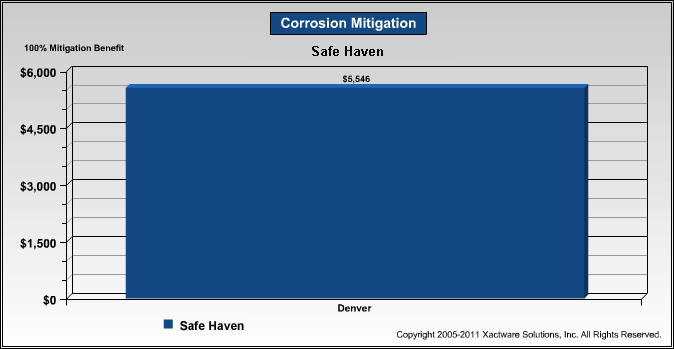
Corrosion Mitigation table
Columns
Estimates: Number of estimates with corrosion mitigation
Total Corrosion Amount: Cost of corrosion damages
Cleaning Amount: Cost to clean damaged items
100% Replacement Cost: Total cost to replace damaged items
50% Replacement Cost: Half of the cost to replace damaged items
25% Replacement Cost: One-quarter of the cost to replace damaged items
100% Mitigation Benefit: Total value saved by using mitigation
50% Mitigation Benefit: Half of the value saved by using mitigation
25% Mitigation Benefit: One-quarter of the value saved by using mitigation
Rows
Geographic/organisational areas

Estimate Flooring Usage
This report displays material quantities and line item totals per estimate for the seven flooring categories used in Xactimate: Carpet, Carpet Pad, Resilient, Stone, Tile, Vinyl, and Wood. This report helps you see which types of flooring items are most used.
- Select a bar in the graph(s) or a flooring category in the table(s) to see data for other levels of your hierarchy, including individual estimates.
Material Value Installed graph
This graph displays the average material value installed per estimate for each flooring category.
- Hover over bars to see the total material value installed.
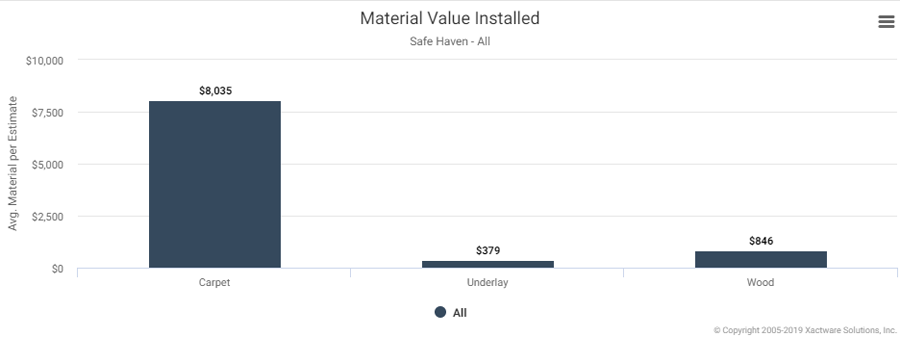
Total Value Installed graph
This graph displays the average total value installed for each flooring category per estimate. The total flooring value comprises material, labour, and equipment cost.
- Hover over bars to see the total value installed.
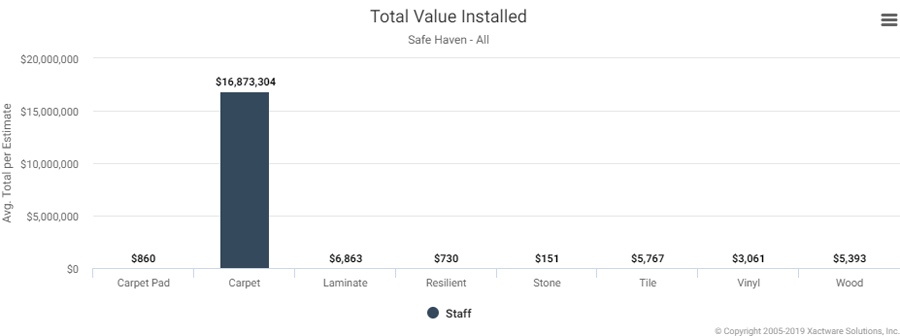
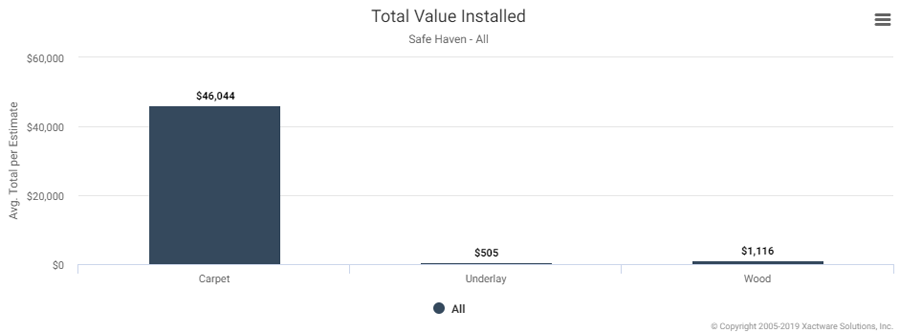
Estimate Flooring Usage table
Columns
Estimates: Number of estimates
M2 Installed: Square metres of flooring material installed
Material Value Installed: Total pound value of flooring material installed
Total Value Installed: Total pound value of flooring line items, including material, labour, and equipment
Avg M2Per Estimate: Average square metres of material installed per estimate (M2 Installed / Estimates)
Avg Material £ Per Estimate: Average flooring material cost per estimate (Material Value Installed / Estimates)
Avg Total £ Per Estimate: Average total flooring cost per estimate (Total Value Installed / Estimates)
Avg Material £ Per M2: Average flooring material cost per square metre (Material Value Installed / M2 Installed)
Avg Total £ Per M2: Average total flooring cost per square metre (Total Value Installed / M2 Installed)
Avg Estimate Value: Average estimate value
Rows
Flooring categories (like Carpet, Carpet Pad, Stone, Tile, Wood, etc)

Estimate Inclusion Issues
This report displays the percentage and number of instances in which work may have been duplicated on estimates. It does this by detecting combinations of item codes that involve duplication. For instance, a line item (e.g. a new sink) may have been included twice on the estimate, when it was intended to be included once. This report helps you track and address estimate errors, ultimately reducing costs due to waste and error.
- Select a bar in the graph or a flooring category in the table to see data for other levels of your hierarchy, including individual estimates and specific line items that violated a rule.
Estimate Inclusion Issues by Instance graph
This graph displays each inclusion issue type found in estimates and the percentage of issues each type had.
- Hover over the bars to see the number of instances.
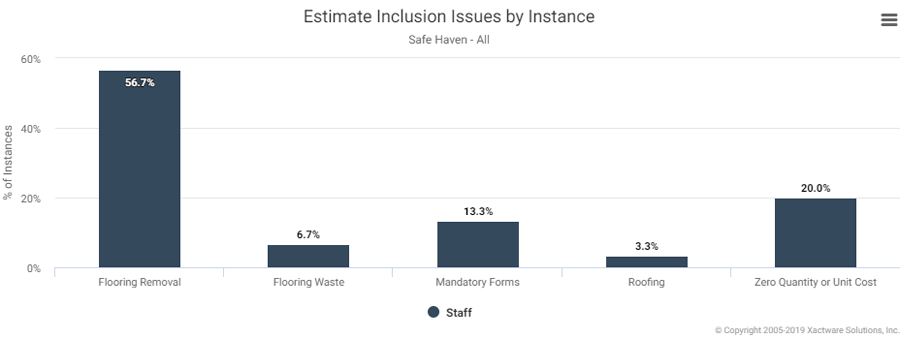
Estimate Inclusion Issues by Estimate graph
This graph displays each inclusion issue type found in estimates and the percentage of estimates with the identified issues.
- Hover over the bars to see the number of estimates.
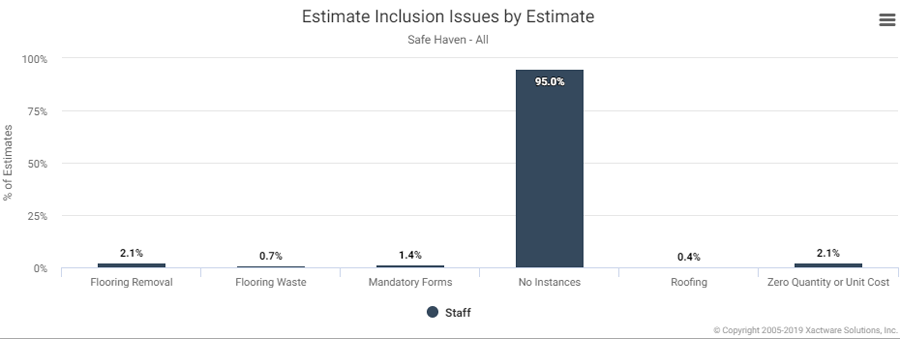
Estimate Inclusion Issues table
Columns
Instances: Number of inclusion issue instances
Estimates: Number of estimates
Avg Instances per Estimate: Average number of inclusion issue instances found per estimate (Instances / Estimates)
% of Instances: Percentage of total instances
% of Estimates: Percentage of total estimates
Rows
Inclusion issue categories (like Doors, Drywall, Floor Covering – Carpet, Roofing, etc) (Pricing categories are only shown if it contains an inclusion issue)
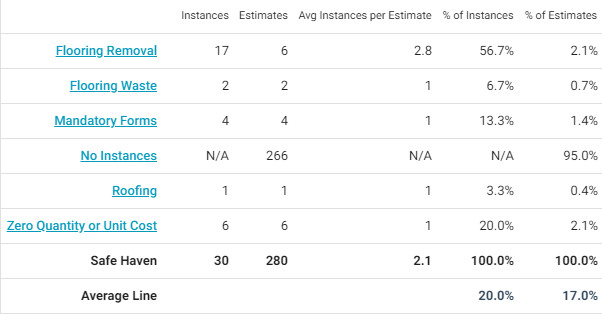
Estimate Items by Quality
This report displays the percentage and number of estimate items (line items) separated into the four Xactimate category grades (low, average, high, and premium). This helps you see the item quality in a given set of estimates.
- Select a bar in the graph or a category grade in the table to see data for other levels of your hierarchy, including individual estimates.
- Hover over bars in the graph to see the number of line items.
Estimate Items by Quality graph
The graph displays the percentage of line items that were used for each category grade.
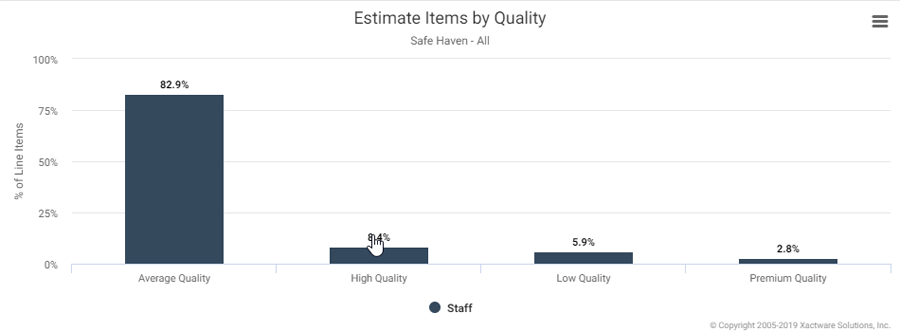
Estimate Items by Quality table
Columns
Line Items: Number of line items
Estimates: Number of estimates
Avg Items per Estimate: Average number of category grade line items per estimate (Line Items / Estimates)
% of Line Items: Percentage of total line items
Estimate Value: Value of estimates
Rows
Category grades (Average Quality, High Quality, Low Quality, and Premium Quality)
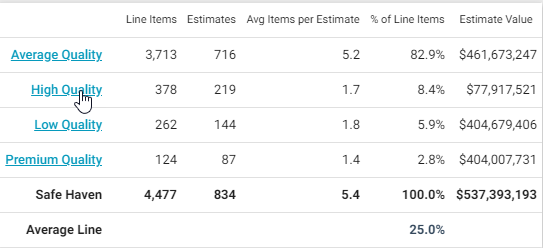
Estimate Overhead and Profit
This report displays the percentage and number of estimates in which overhead and profit were or were not applied. Overhead is the percentage an adjuster or contractor is allowed to mark up an estimate to cover overhead expenses, such as driving to the job and office costs. Profit is the percentage the adjuster or contractor is allowed to mark up the estimate to ensure a profit. Adjusters or contractors are typically limited to a 10% markup for both overhead and profit.
- Select a bar in the graph or a link in the table to see data for other levels of your hierarchy, including individual estimates.
- Hover over bars in the graph to see the number of estimates.
Estimate Overhead and Profit Usage graph
This graph displays the percentage of estimates that have or do not have overhead and profit.
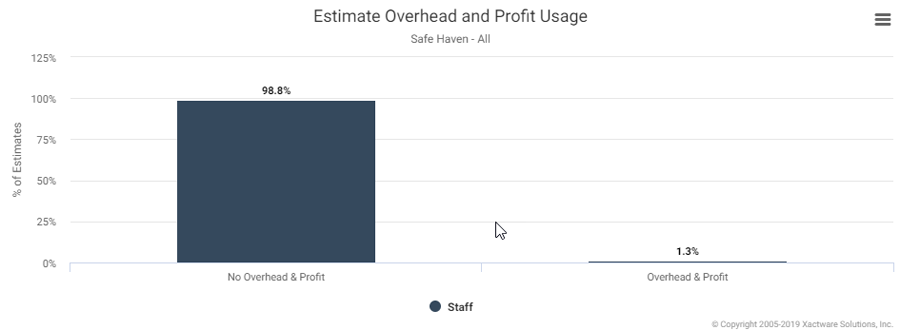
Estimate Overhead and Profit table
Columns
Estimates: Number of estimates
% of Estimates: Percentage of total estimates that have or do not have O&P
Estimates with 1 Base Service Charge: Number of estimates with one base service charge
Estimates with 2 Base Service Charges: Number of estimates with two base service charges
Estimates with 3+ Base Service Charges: Number of estimates with three or more base service charges
Rows
No Overhead & Profit
Overhead & Profit

Estimate Roofing Usage
This report displays estimate material quantities and line item totals for the nine roofing categories used in Xactimate: Built Up, Composite, Composition, Membrane, Metal, Slate, Tile, Wood, and Miscellaneous. This report helps you see which types of roofing items are most used.
- Select a bar in the graph or a roofing category in the table to see data for other levels of your hierarchy, including individual estimates.
Material Value Installed graph
This graph displays the average pound amount of roofing material used per estimate, by roofing category.
- Hover over the bars to see the total pound amount of roofing material estimated.
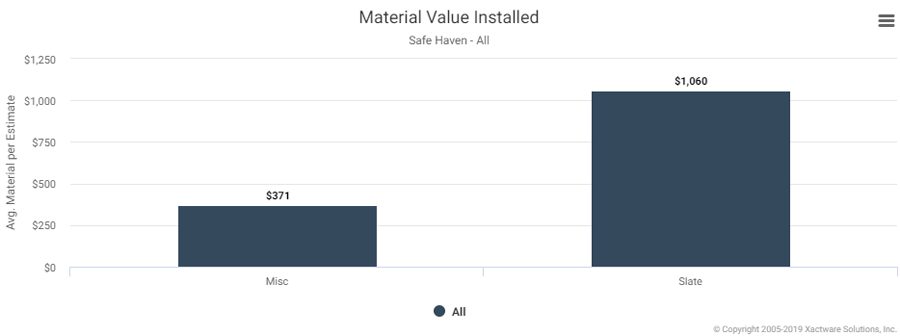
Total Value Installed graph
This graph displays the average total roofing value installed for each roofing category per estimate. The total roofing value installed includes material, labour, and equipment.
- Hover over the bars to see the total value installed.
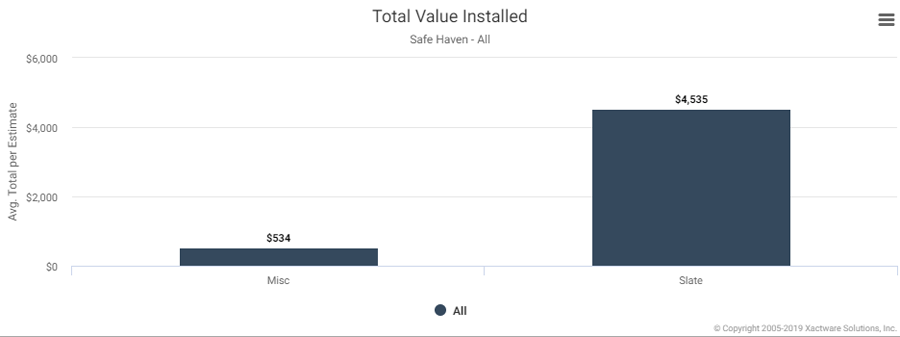
Estimate Roofing Usage table
Columns
Estimates: Number of estimates with roofing
M2 Installed: Metres squared of roofing material installed
Material Value Installed: Value of estimated roofing material
Total Value Installed: Total Value of roofing line items, including material, labour, and equipment
Avg M2 Per Estimate: Average number of metres squared installed per estimate (M2 Installed / Estimates)
Avg Material £ Per Estimate: Average roofing material cost per estimate (Material Value Installed / Estimates)
Avg Total £ Per Estimate: Average total roofing cost per estimate (Total Value Installed / Estimates)
Avg Material £ Per M2: Average roofing material cost per metre squared (Material Value Installed / M2 Installed)
Avg Total £ Per M2: Average total roofing cost per metre squared (Total Value Installed / M2 Installed)
Avg Estimate Value: Average estimate value
Rows
Roofing categories (like built-up, composite, composition, membrane, metal, slate, tile, wood, etc)
- Click [Report Items] to see the report details for each line item in the category.

Estimate Scoping Overlap
This report displays the percentage and number of possible quantity calculation errors in estimates. It does this by checking for instances in which the quantity specified for a line item exceeds the maximum or usual maximum quantity for such an item in the room. This report helps you track and address estimate errors.
- Select a bar in the graph or an instance category in the table to see data for other levels of your hierarchy, including individual estimates and specific line items that violated a rule.
Estimate Scoping Overlap by Instance graph
This graph displays the percentage of scoping instances by instance category.
- Hover over the bars to see the number of instances.
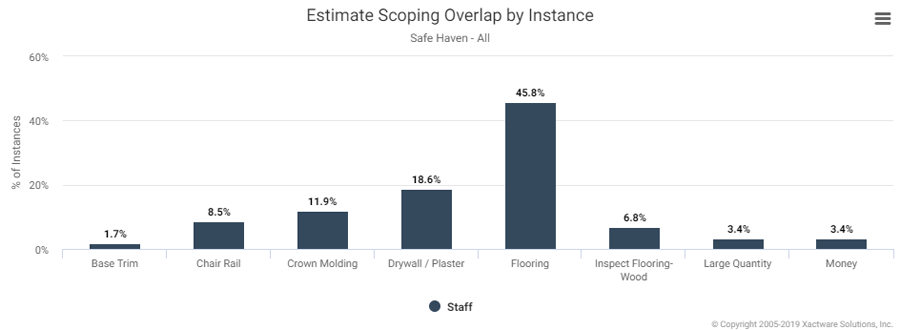
Estimate Scoping Overlap by Estimate graph
This graph displays the percentage of estimates with scoping instances by instance category.
- Hover over the bars to see the number of estimates.
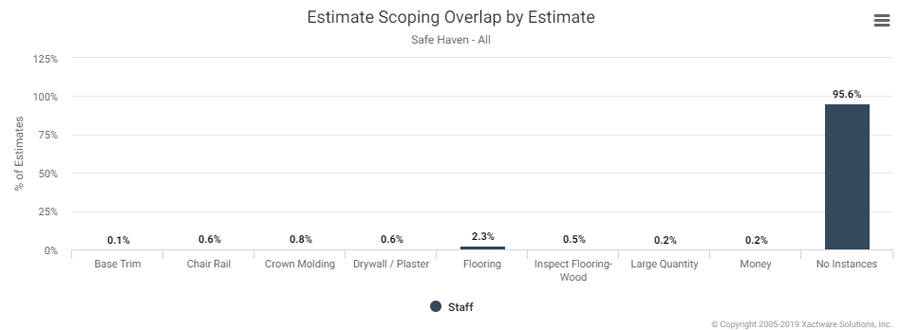
Estimate Scoping Overlap table
Columns
Instances: Number of instances
Estimates: Number of estimates with overlap issues
Avg Instances per Estimate: Average number of instances per estimate (Instances / Estimates)
% of Instances: Percentage of total instances
% of Estimates: Percentage of total estimates
Rows
Instance categories (like Doors, Drywall, Floor Covering – Carpet, Roofing, etc) (Instance categories are only shown if it contains a line item that exceeds the maximum or usual maximum quantity for such an item in the room)
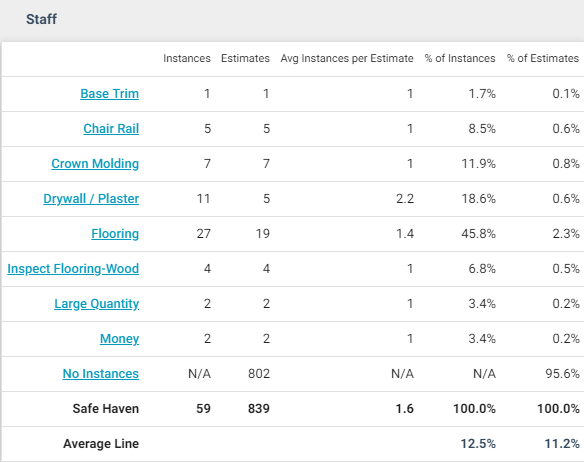
Estimate Siding Usage
This report displays material quantities and line item totals for the four siding categories used in Xactimate: Metal, Vinyl, Wood, and Miscellaneous. This report helps you track the types of siding items used most frequently.
- Select a bar in the graph or a siding category in the table to see data for other levels of your hierarchy, including individual estimates.
Material Value Installed graph
This graph displays the average cost of siding material used per estimate, by siding category.
- Hover over the bars to see the total material value installed.
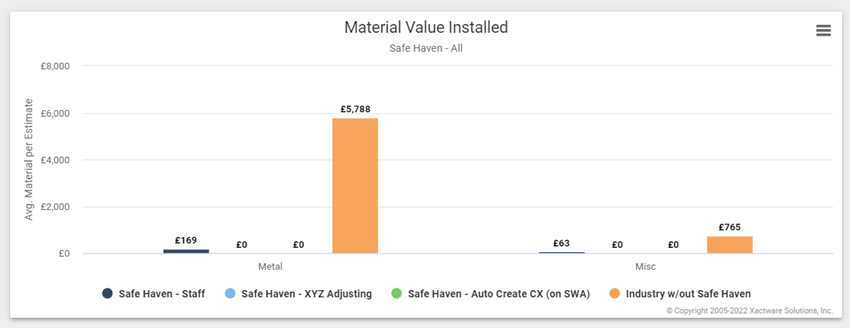
Total Value Installed graph
This graph displays the average total siding value installed for each siding category per estimate. The total siding value installed includes material, labour, and equipment.
- Hover over the bars to see the total value installed.
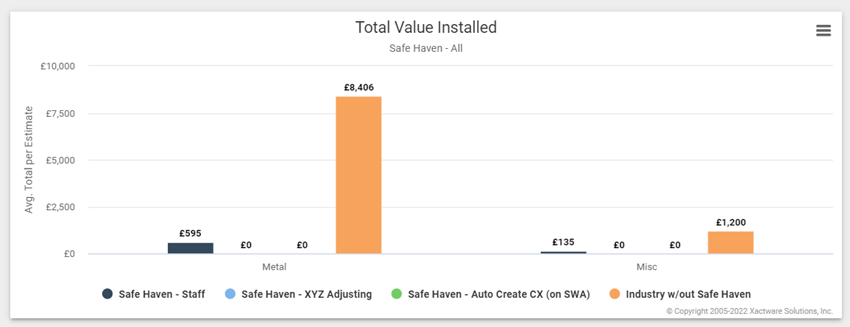
Estimate Siding Usage table
Columns
Estimates: Number of estimates with siding
M2 Installed: Square metres of siding material installed
Material Value Installed: Value of installed siding material
Total Value Installed: Total pound value of siding line items, including material, labour, and equipment
Avg M2 Per Estimate: Average square metres installed per estimate (M2 Installed / Estimates)
Avg Material £ Per Estimate: Average siding material cost per estimate (Material Value Installed / Estimates)
Avg Total £ Per Estimate: Average total siding cost per estimate (Total Value Installed / Estimates)
Avg Material £ Per M2: Average siding material cost per square metre (Material Value Installed / M2 Installed)
Avg Total £ Per M2: Average total siding cost per square metre (Total Value Installed / M2 Installed)
Avg Estimate Value: Average estimate value
Rows
Roofing categories (like built-up, composite, composition, membrane, metal, slate, tile, wood, etc).
- Click [Report Items] to see the estimate line items.
Estimate Tax Usage
This report displays the number and percentage of estimates with tax, material sales tax, equipment tax, labour tax, flat tax, other tax, and any combination of these taxes.
- Select a bar in the graph or a tax category in the table to see data for other levels of your hierarchy, including individual estimates.
- Hover over bars in the graph to see the number of estimates.
Estimate Tax Usage graph
This graph displays the percentage of estimates that fall under each tax category.
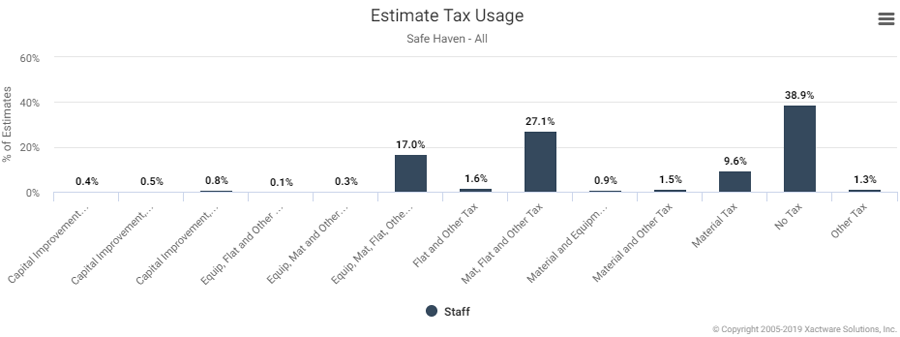
Estimate Tax Usage table
Columns
Estimates: Number of estimates
% of Estimates: Percentage of total estimates
Rows
Tax categories
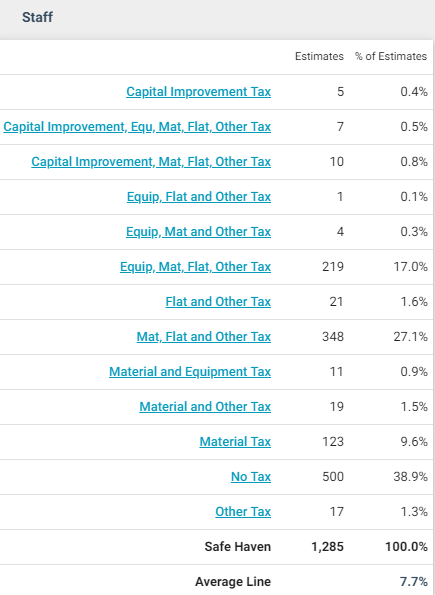
Estimate Peril
This report displays the percentage, value, and number of estimates by peril. This report helps you track which types of loss are most frequent and infrequent, which often varies by locality.
- Select a bar in the graph or a peril in the table to see data for other levels of your hierarchy, including individual estimates.
Peril by Estimate graph
This graph displays the percentage of estimates per peril.
- Hover over the bars to see the number of estimates.
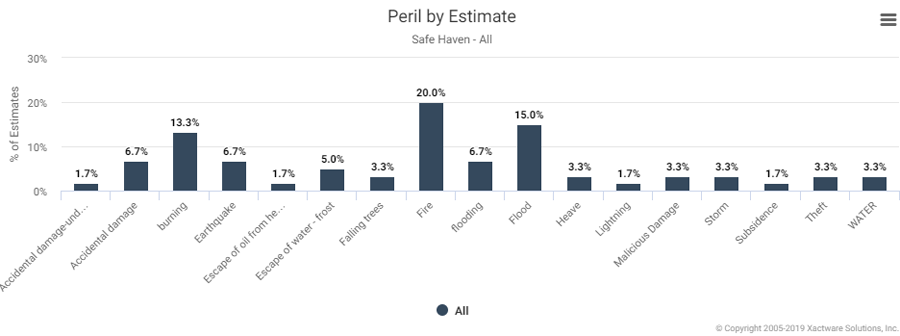
Peril by Estimate Value graph
This graph displays the percentage value of all estimates per peril.
- Hover over the bars to see the estimate value.
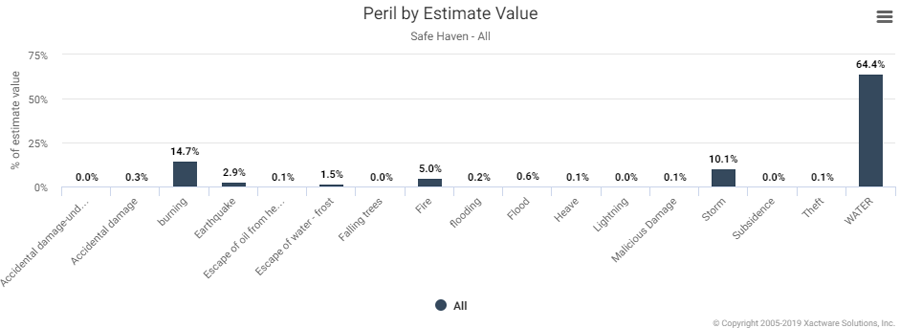
Estimate Peril table
Columns
Estimates: Number of estimates
Estimate Value: Total estimate value
Avg Estimate Value: Average estimate value (Estimate Value / Estimates)
% of Estimates: Percentage of total estimates
% of Estimate Value: Percentage of total estimate value
Rows
Peril categories
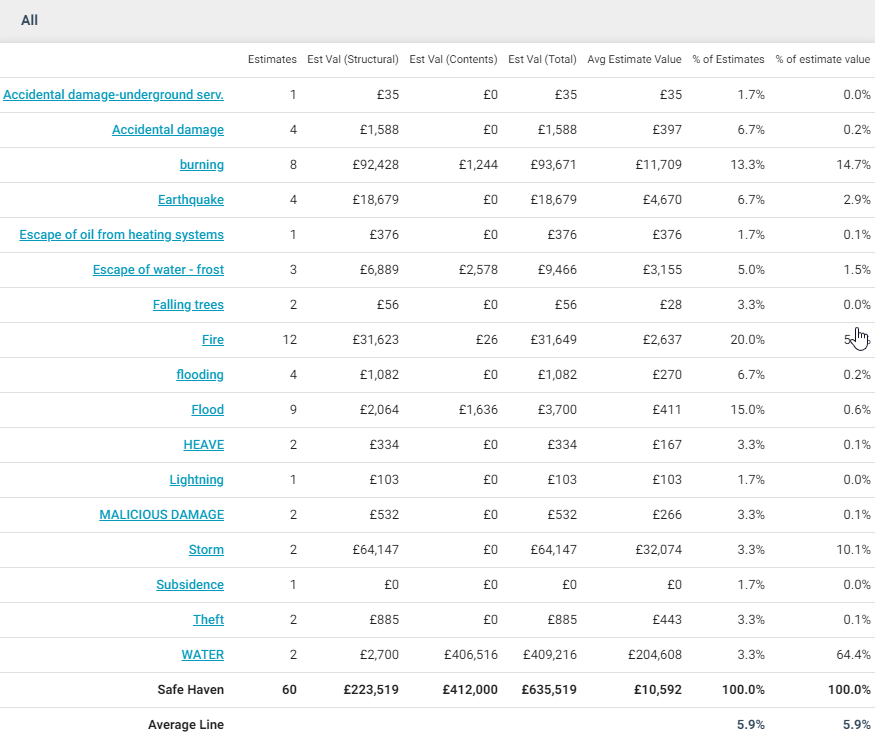
Estimate/Price List Differences
This report displays the percentage and number of price list line items that changed in Xactimate during the estimating process, thereby deviating from the checkpoint price list. It shows changes in unit of measure, description, price, and all combinations of these categories. All Changed includes line items that are not in the price list.
- Select a bar in the graph or a price list difference category in the table to see data for other levels of your hierarchy, including individual estimates.
- Hover over bars in the graph to see the number of line items.
Estimate/Price List Differences graph
This graph displays the percentage of line items that changed, by price list differences category.
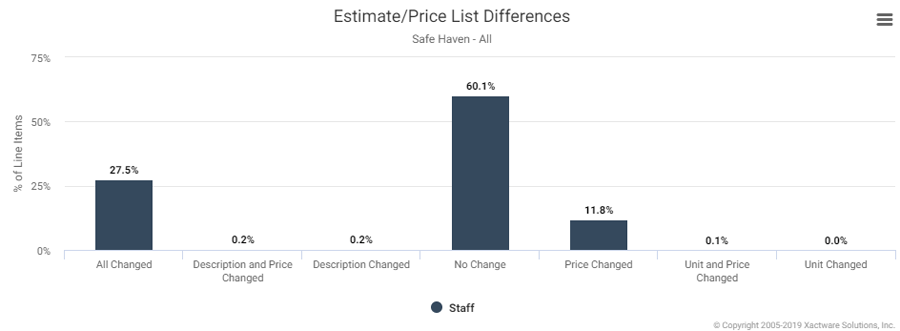
Estimate/Price List Differences table
Columns
Line Items: Number of line items
Estimates: Number of estimates
Avg Items per Estimate: Average number of line items per estimate (Line Items / Estimates)
% of Line Items: Percentage of total line items
Rows
All Changed: Estimates with at least one line item description, price, and unit change
Description Changed: Estimates with at least one line item description change
Description and Price Changed: Estimates with at least one line item description and price change
Description and Unit Changed: Estimates with at least one line item description and unit change
No Change: Estimates with no change
Price Changed: Estimates with at least one line item price change
Unit Changed: Estimates with at least one line item unit change
Unit and Price Changed: Estimates with at least one line item unit and price change
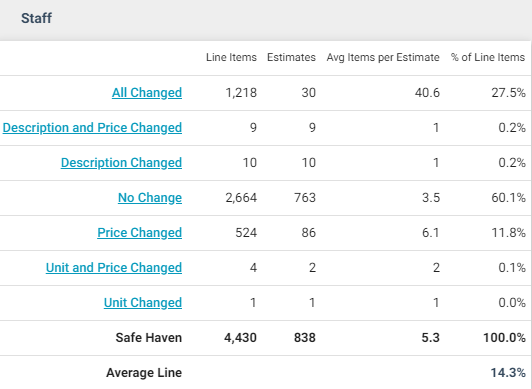
Estimate/Price List Differences for Contents
This report displays the percentage and number of contents line items that changed in Xactimate during the estimating process, thereby deviating from the checkpoint pricelist. It shows changes in unit of measure, description, price, and all combinations of these changes (including No Change). All Changed includes line items that are not in the price list.
- Select a bar in the graph or a price list difference category in the table to see data for other levels of your hierarchy, including individual estimates.
- Hover over bars in the graph to see the number of line items.
Estimate/Price List Differences graph
This graph displays the percentage of contents line items that changed, by price list differences category.
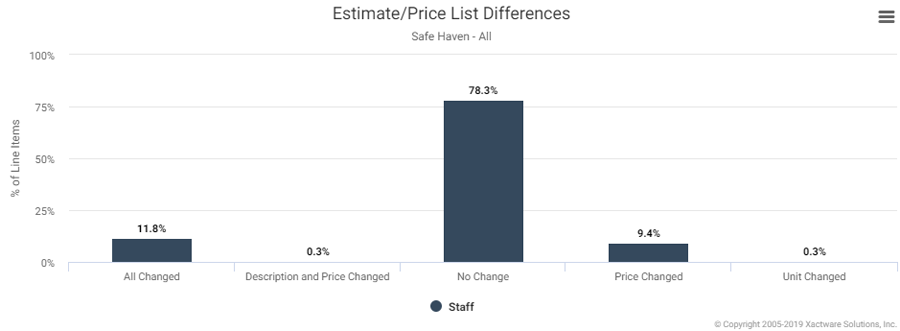
Estimate/Price List Differences for Contents table
Columns
Line Items: Number of line items
Estimates: Number of estimates
Avg Items per Estimate: Average number of line items per estimate (Line Items / Estimates)
% of Line Items: Percentage of total line items
Rows
All Changed: Estimates with at least one line item description, price, and unit change
Description Changed: Estimates with at least one line item description change
Description and Price Changed: Estimates with at least one line item description and price change
No Change: Estimates with no change
Price Changed: Estimates with a line item price change
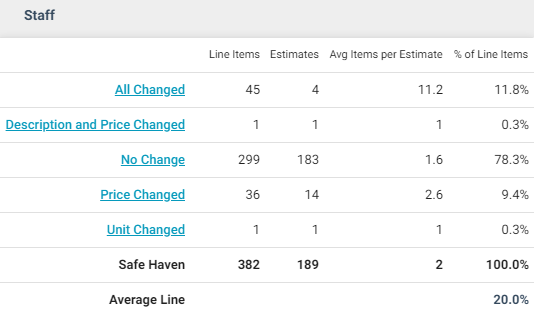
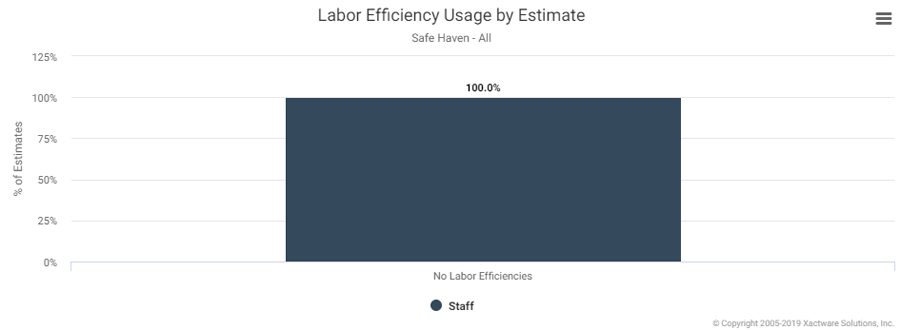
Percentage Breakdown of Estimate by Department
This report displays the percentage each contents department contributed to the selected estimates’ total line item value, helping you track the types of line items used most frequently.
- Select a bar in the graph or a line item category in the table to see data for other levels of your hierarchy, including individual estimates.
- Hover over bars in the graph to see the line item value.
Percentage Breakdown of Estimate by Department graph
This graph displays each contents department’s percentage of estimates’ total line item value.
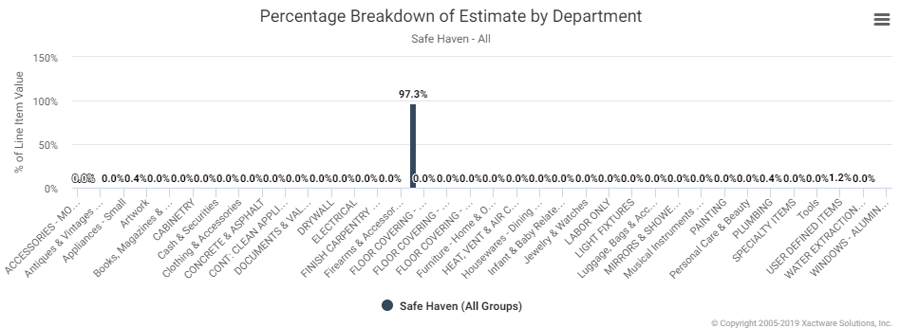
Percentage Breakdown of Estimate by Department table
Columns
Estimates: Number of estimates
Line items Value: Value of line items
% of Line Items Value: Percentage of total line items value
Rows
Contents departments
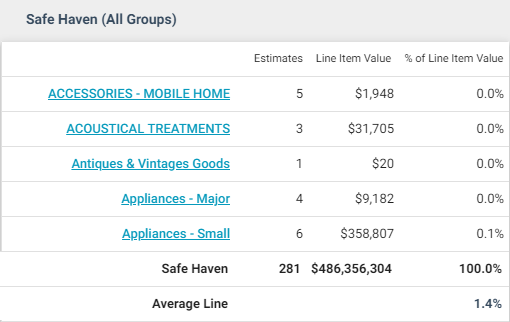
Percentage Breakdown of Estimate by Trade
This report displays the percentage and value the line items from each trade (for example, Carpenter, Plumber, etc.) contribute to the total estimate pound value, helping you track the trades used most frequently.
- Select a bar in the graph or a trade category in the table to see data for other levels of your hierarchy, including individual estimates.
- Hover over bars in the graph to see the line item value.
Percentage Breakdown of Estimate by Trade graph
This graph displays each trade’s percentage of total estimate line item value.
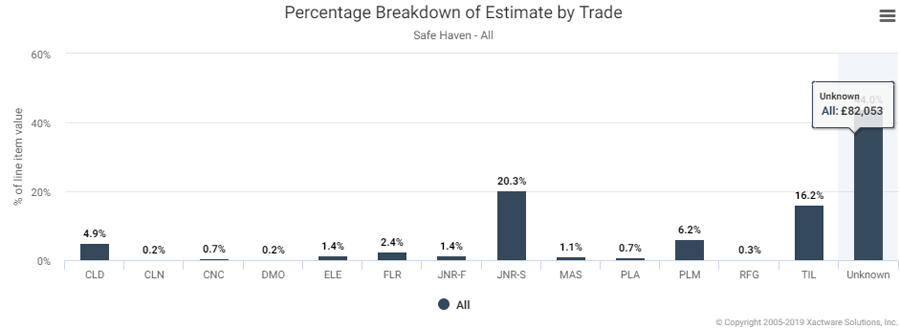
Percentage Breakdown of Estimate by Trade table
Columns
Estimates: Number of estimates
Line Items Value: Value of line items
% of Line Items Value: Percentage of total line item value
Rows
CARP-FNC: Carpenter – Finish, Trim/Cabinet
CARP-FRM: Carpenter – General Framer
CARP-MECH: Carpenter – Mechanic
CLN: Cleaning Technician
CLN-F: Floor Cleaning Technician
CNC: Concrete Mason
DMO: Demolition
DRY: Drywall Installer/Finisher
ELE: Electrician
EQU: Equipment Operator
FLR: Flooring Installer
HDW: Hardware Installer
HVC: Heating / A.C. Mechanic
INS: Insulation Installer
LBR: General Labourer
MAS: Mason Brick/Stone
PLA: Plasterer
PLM: Plumber
PNT: Painter/Wallpaperer
RFG: Roofer
SDG: Siding Installer
STL: Steel Worker
STU: Stucco Installer
SUB: Non Labour item
TIL: Tile/Cultured Marble Installer
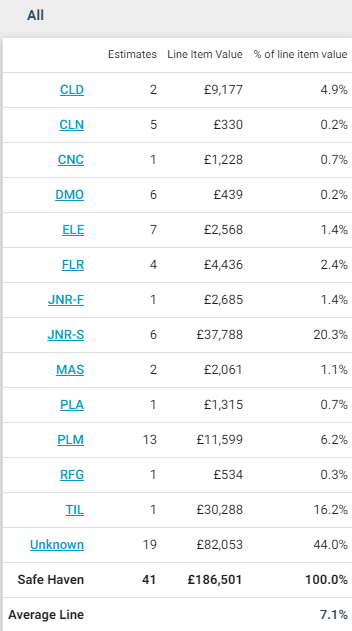
Percentage Deviation of Estimate by Trade
This report displays the percentage deviation of estimate prices from price list prices, by trade category, helping you ensure that estimate prices are accurate. This report also shows the number of estimates, number of line items, estimate value, value of deviating line items, average estimate deviation, and percent overall deviation.
- Select a bar in the graph or a trade category in the table to see data for other levels of your hierarchy, including individual estimates.
- Hover over bars in the graph to see the value of the deviations.
Percentage Deviation of Estimate by Trade graph
This graph displays the percentage deviation of estimate prices from price list prices, by trade category.
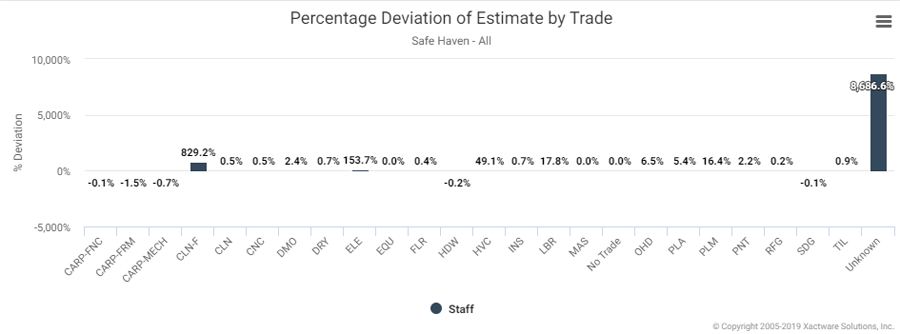
Percentage Deviation of Estimate by Trade table
Columns
Estimates: Number of estimates
Estimates w/Price Deviation: Number of estimates with price deviations
Line Items: Number of line items
Line Items w/Price Deviation: Number of line items with price deviations
Line Item Value: Total value of line items from estimates
Price List Value: Total value of line items from the price list
Deviation: Total value of deviations (Line Item Value - Price List Value)
Avg Deviation: Average value of deviations per estimate (Deviation / Estimates w/Price Deviation)
% Deviation: Percentage of deviation from the price list value
Rows
CARP-FNC: Carpenter – Finish, Trim/Cabinet
CARP-FRM: Carpenter – General Framer
CARP-MECH: Carpenter – Mechanic
CLN: Cleaning Technician
CLN-F: Floor Cleaning Technician
CNC: Concrete Mason
DMO: Demolition
DRY: Drywall Installer/Finisher
ELE: Electrician
EQU: Equipment Operator
FLR: Flooring Installer
HDW: Hardware Installer
HVC: Heating / A.C. Mechanic
INS: Insulation Installer
LBR: General Labourer
MAS: Mason Brick/Stone
PLA: Plasterer
PLM: Plumber
PNT: Painter/Wallpaperer
RFG: Roofer
SDG: Siding Installer
STL: Steel Worker
STU: Stucco Installer
SUB: Non Labour item
TIL: Tile/Cultured Marble Installer
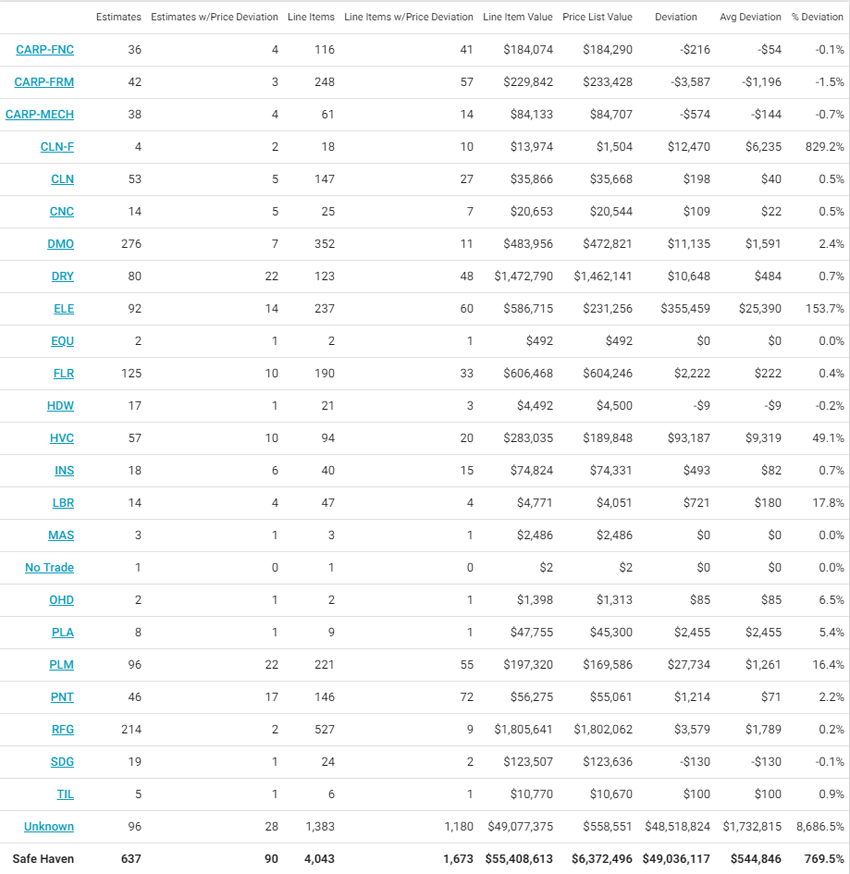
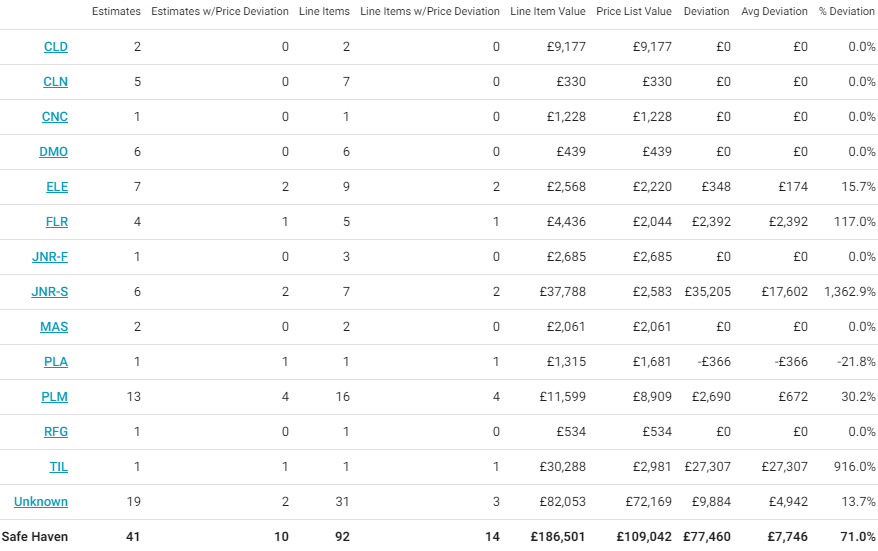
Top 20 Causes of Loss
This report displays the 20 causes of loss that contain the highest estimate value for a given data set or hierarchy. The Other total includes all categories that are not part of the 19 categories appearing in the report. Lower hierarchy levels may have causes of loss that vary from these categories, so fewer categories may be displayed. Select a bar in the graph or a price list category in the table to see data for other levels of a company’s hierarchy, including individual estimates.
Average Value by Cause of Loss graph
This bar graph displays the average value by cause of loss for each top 20 price-list category.
Top 20 Causes of Loss table
Columns
Estimates: Number of estimates
Total Estimate Value: Total estimate value of all estimates in with this cause of loss
Total ACV: Total Actual Cash Value (or the money equal to the cost of replacing lost, stolen, or damaged property after applying depreciation) of all the estimates with this cause of loss
Total Net Claim: The total cash estimate of the claims minus the total deductible amounts
Avg Estimate Value: Average estimate value (Total Estimate Value / Estimates)
% of Total Estimates: The percent of all estimates in the data set with this cause of loss (Number of claims with this cause of loss / Total number of claims)
% of Total Value: The percent of the total value of all estimates in the data set with this cause of loss (Total value of claims with this cause of loss / Total value of all claims)
Rows
Cause of loss categories: Collapse, Fire, Frozen Pipe, Hail, Water Heater, etc (Select the Components link to see individual items used to categorise the estimates)
Top 20 Material Categories
This report displays the 20 price list categories that contain the highest value of materials for a given data set or hierarchy. The Other total includes all categories that are not part of the 19 categories appearing in the report. Lower hierarchy levels may have material values that vary from these categories, so fewer categories may be displayed. This report helps you see which materials are most and least used.
- Select a bar in the graph or a price list category in the table to see data for other levels of your hierarchy, including individual estimates.
- Select a components link in the table to see individual items used to categorise the estimates.
Material Value by Category graph
This graph displays the average material value for each top 20 price list category.
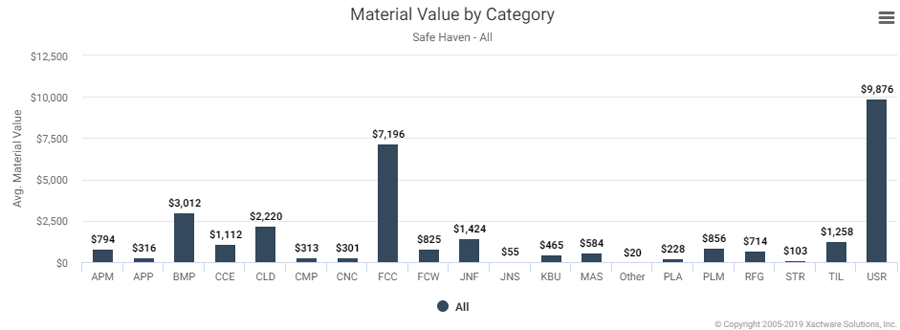
Top 20 Material Categories table
Columns
Estimates: Number of estimates
Material Value: Material value
Total Estimate Value: Total estimate value
Avg Material £ per Estimate: Average value of material per estimate (Material Value / Estimates)
Avg Estimate Value: Average estimate value (Total Estimate Value / Estimates)
Rows
Price list categories (Select a components link to see individual items used to categorise the estimates).
